Exploring the Multifaceted Legacy of 'The Godfather'
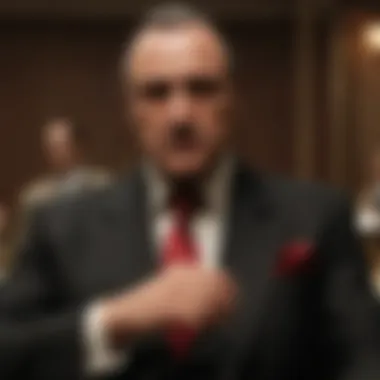
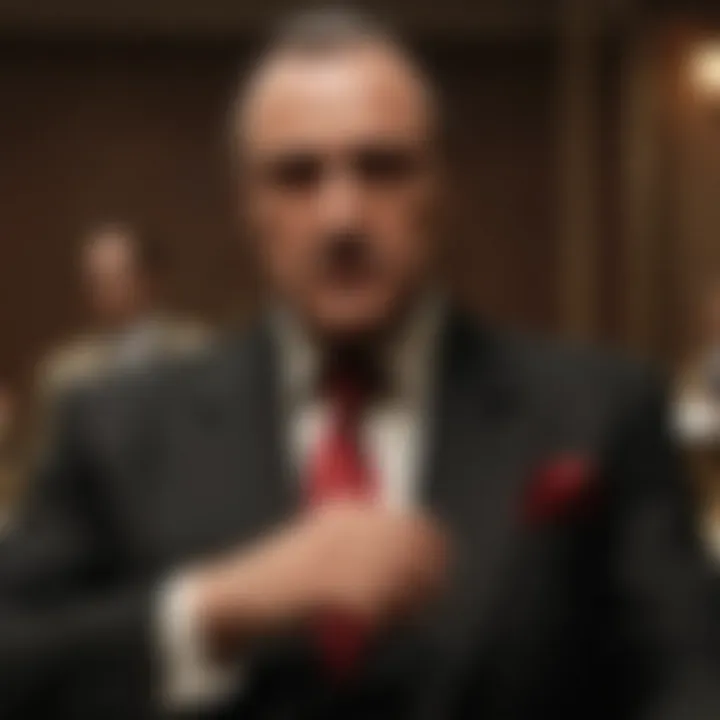
Intro
When you think about cinema, few films come to mind with the weight and intricacy of the Godfather series. These movies have gone beyond mere entertainment, leaving an indelible mark on the cultural landscape. The series debuted with its first film in 1972, captivating audiences with a potent mix of drama, family loyalties, and the brutal realities of the mob underworld. What stands out is not just the gripping narrative but also the nuanced themes that resonate through generations, exploring power dynamics, morality, and the American Dream.
Delving into this complex legacy, the article will dissect the many layers that compose the Godfather films, offering insights that extend from character arcs to cinematic techniques. By examining how these aspects interconnect, we can unravel the essence that makes the series a towering masterpiece of filmmaking.
Overview of Cinema/TV shows/Games/Comic Books
While the Godfather primarily exists as a cinematic landmark, its influences ripple through various facets of culture, including television shows, video games, and even comic books. The storytelling techniques and archetypal characters have inspired a plethora of content that borrows from its themes, from gritty dramas on television to interactive narratives in gaming.
- Latest Updates and News
The series itself has seen re-releases and restorations that keep bringing new audiences into the fold. Special editions often accompany significant anniversaries, leveraging both nostalgia and fresh critiques. - Trends and Popularity
The Godfather’s cultural relevance continues to thrive. It has become a benchmark for storytelling, influencing countless narratives and characters in contemporary cinema and beyond. From mob-related shows to crime dramas, the thematic elements introduced in the Godfather are still in play. - Releases and Announcements
Rumors occasionally swirl about potential prequels or spin-offs, reflecting a desire to explore the vast universe the Corleones inhabit. A deeper dive into this world could yield new stories that echo the complexities of the original tale.
In-Depth Analysis
Plot Summary and Analysis
The narrative of the Godfather series centers around the life of Vito Corleone and his son Michael, weaving a tale steeped in familial obligations and the intricacies of power. The plot intricately stitches together various threads, depicting the brutal struggles of maintaining a crime syndicate while navigating personal loyalties and moral dilemmas.
"A man who doesn't spend time with his family can never be a real man."
This quote encapsulates the dichotomy of the Corleone family: the intersection of family responsibility and the ruthless pursuit of power.
Character Development
Character arcs in the Godfather series are a masterclass in depth and complexity. Michael Corleone evolves from a reluctant outsider to a calculating leader, showcasing a compelling transformation shaped by tragic events. Each character—from the wise Vito to the fiercely loyal Tom Hagen—offers a glimpse into various responses to power, loyalty, and betrayal.
Setting and Cinematography
Cinematography in the Godfather is deliberately structured, using lighting, framing, and color to evoke the emotional undercurrents of each scene. The rich, dark tones reflect the gravity of the subject matter, while the setting—ranging from lavish parties to somber funeral homes—adds layers to the viewer's understanding of the characters' internal struggles.
Behind the Scenes
Interviews with Cast and Crew
Behind the iconic moments lie the hard work and vision of cast and crew that shaped the Godfather. Interviews reveal the collaborative nature of filmmaking, with each contributor lending their unique touch to the narrative. The passion displayed by actors, especially Marlon Brando and Al Pacino, is evident as they navigated their roles with distinctive dedication.
Production Insights
The Gods of filmmaking, director Francis Ford Coppola and producer Albert S. Ruddy, navigated tricky waters during production. Securing the necessary budget, managing studio expectations, and adapting Mario Puzo’s novel into a coherent screenplay required tenacity and vision.
Reviews and Recommendations
Critic Reviews and Ratings
The Godfather films have consistently garnered critical acclaim, often topping lists of the greatest films of all time. Critics appreciate the nuanced storytelling that intertwines grand themes with intimate character moments.
User Reviews and Comments
Community forums like Reddit often discuss favorite scenes, character motivations, or unseen details, demonstrating how deeply the series has permeated popular consciousness. One can be sure to find passionate discourse about everything from cinematography to moral conflicts.
Recommendation Lists
For those intrigued by the Godfather saga, viewing companion films like Goodfellas or Scarface can offer further exploration into the mafia genre’s evolution. Other suggestions include The Sopranos, which directly draws from the narrative templates established by the Godfather, bringing its themes into the realm of television.
Prologue to 'The Godfather'
When discussing cinematic landmarks, The Godfather series stands as a towering figure, embodying the essence of storytelling that resonates across generations. This exploration seeks to unpack the thematic richness and cultural ramifications of a saga that has become synonymous with the portrayal of organized crime, family loyalty, and moral complexity. It invites the audience to reflect on its storytelling prowess and the intricate web of character dynamics interwoven throughout the films.
The Origins of the Franchise
The roots of The Godfather franchise trace back to Mario Puzo’s novel, published in 1969. Puzo’s narrative, which skillfully intertwines family drama with the underworld of mafia, offered a fresh perspective on crime that was not just about the action, but rather the emotional and moral struggles within families engaged in such nefarious endeavors. The book's success laid the groundwork for an adaptation that would redefine the gangster genre, paving the way for the first film's release in 1972. Francis Ford Coppola, along with Puzo himself collaborating on the screenplay, began shaping a cinematic experience that would soon become a cultural touchstone.
Overview of the Films
Film summaries
The saga unfolds in three primary films—The Godfather (1972), The Godfather Part II (1974), and The Godfather Part III (1990). Each film encapsulates a significant chapter in the Corleone family’s narrative, chronicling their rise, tumult, and eventual decline within the organized crime hierarchy.
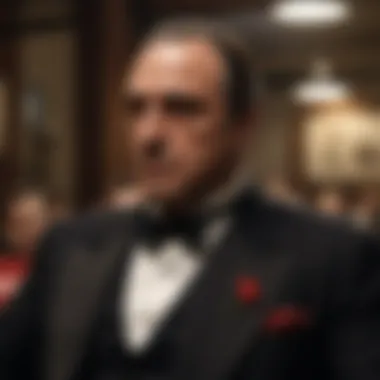
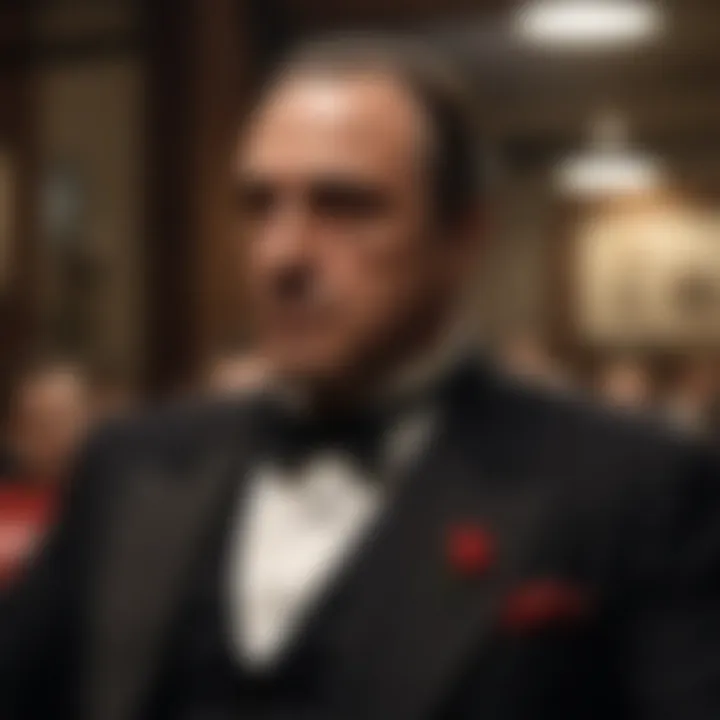
- The first film focuses on Vito Corleone’s establishment of his family’s power, introducing Michael, who initially distances himself from the criminal world but is inevitably drawn into its embrace.
- In the second installment, the narrative swings between Vito’s early days and Michael’s struggles to solidify control, exploring the cost of power and the scars it leaves.
- The final film portrays Michael’s quest for redemption, a bitter battle against his past that ultimately serves to illustrate the futility of escape from one’s lineage.
Each entry not just showcases the evolution of its characters but also mirrors broader societal shifts, creating a tapestry that reflects both personal and collective histories.
Key themes
The key themes woven into the narrative fabric of the series are profound and multi-layered. At its core lies the exploration of power and its corruption—how ambition can warp morality until one's personal ethics are as fragile as a soap bubble. Family loyalty, often viewed as a double-edged sword, serves as a directive force that binds the Corleones while simultaneously sowing seeds of destruction.
- The interplay between loyalty and betrayal presents a striking commentary on the human condition, illuminating both virtues and vices.
- The contrast between legitimate business and criminal endeavors invites viewers to question the lines between right and wrong, good and evil.
These themes not only contribute to the unfolding drama but have also led to a sustained analysis in popular culture, enriching discussions around ethics, leadership, and familial bonds within a contemporary context.
Overall, the The Godfather series isn’t merely a story about the mafia; it’s a lens through which one can examine the intricate dance of morality, power, and familial connections that can resonate in various aspects of life beyond the screen.
Character Study: The Corleones
In understanding the complex legacy of ‘The Godfather’ series, one cannot overlook the pivotal role played by the Corleone family. This family is not just a backdrop; they are the essence of the narrative, driving the thematic core of power, loyalty, and transformation. The interactions among family members and their relationships with external forces showcase the duality of love and violence, a contrast that deeply resonates with audiences. The characterization is richly layered, reflecting not only the intricacies of mob life but also universal aspects of morality, ambition, and betrayal. Each character in the Corleone family plays an instrumental role in dissecting the series' key themes.
Vito Corleone: The Patriarch
Vito Corleone, as the patriarch of the Corleone family, embodies the intersection of power and vulnerability. His character is the foundation upon which the series builds its exploration of family dynamics and moral complexities. Vito is presented as a shrewd strategist who navigates the murky waters of crime with a mix of charm and intimidation. His famous line, "I’m gonna make him an offer he can’t refuse," encapsulates his unique blend of persuasion and fear.
His relationships are pivotal; Vito demonstrates an unwavering commitment to his family and his roots while simultaneously engaging in morally questionable activities. This duality fosters a sense of empathy among viewers, making them question the boundaries between right and wrong. As the head of the family, Vito's decisions set the stage for the tragic unfolding of events that follow, making him a linchpin in the series’ narrative.
Michael Corleone: Transformation and Conflict
Michael Corleone's journey from an outsider to the head of the Corleone family is one of the most compelling arcs in the saga. His transformation is marked by internal and external conflict that serves to highlight central themes of power and legacy.
Moral dilemmas
Michael faces profound moral dilemmas that challenge his values and identity. Initially, he seeks to distance himself from the family's criminal undertakings, representing a hope for redemption. However, as the narrative unfolds, he must navigate a landscape riddled with choices that force him to confront his own ethics. The tension between love for his family and the brutality of the mafia life propels Michael into a dark metamorphosis.
This aspect is particularly significant because it invites the audience to evaluate their own moral compass. How far would one go to protect their loved ones? The charm of Michael's character lies in this perpetual struggle, making his journey relatable and poignant.
Character arc
Michael’s character arc showcases a gradual yet chilling transformation fueled by ambition and vengeance. The gradual shift from naive war hero to a cold-blooded mafia leader reflects the dark side of American dream, suggesting that the pursuit of power often comes at a great cost. This character evolution serves to demonstrate the inextricable link between power and corruption.
His arc is compelling and complex—a blend of tragedy and inevitability that resonates deeply. Michael’s story is not merely about the rise of a mafia boss; it’s a cautionary tale about how power can corrupt even the most righteous individuals. The depth of his arc adds layers to the narrative, making Michael one of cinema's most unforgettable characters.
Supporting Characters: Beyond the Family
In addition to the Corleone patriarchs, supporting characters add richness to the story, presenting alternative perspectives on themes of loyalty and betrayal.
Tom Hagen
Tom Hagen, the Corleone family consigliere, acts as a bridge between the family's ruthless business and its personal relationships. His role highlights the complexities of loyalty. As an adopted son, he walks a fine line; his allegiance to the family is unwavering yet complicated by his outsider status. Tom's pragmatic approach often brings balance to decisions, emphasizing the costs of such alliances. His character is pivotal in showcasing how loyalty can often be more about duty than common blood.
Fredo Corleone
Fredo Corleone represents the fragility within family dynamics. Always overshadowed by Michael, Fredo’s journey illustrates the pain of inadequacy and betrayal. His character is tragic—in constant need for approval yet destructive in his quest for validation. Fredo's ultimate decisions drive a wedge in the family, portraying the crushing weight of expectations and the dire consequences of feeling insignificant.
Kay Adams
Kay Adams is the lens through which we see Michael's morally ambiguous world. As Michael's wife, she serves a dual role—both a representation of innocence and a voice of reason. Kay's struggles to comprehend Michael’s transformation and his choices ground the story in emotional reality, making the viewers care about the personal costs of his decisions. Her character raises questions about complicity and the painful sacrifices made in the name of love.
Ultimately, the Corleones—and their supporting characters—provide an intricate portrait of the challenges inherent in power and trust, all while serving as a commentary on family, loyalty, and the price of ambition. Through this character study, we can appreciate the rich, textured storytelling that defines ‘The Godfather’ series.
Themes of Power and Corruption
The theme of power and corruption resonates deeply throughout the Godfather series, serving as a fundamental backbone that supports the narrative's intricate structure. At its core, this theme presents a harsh examination of human ambition and the lengths one might go to attain control. It's not just about the mafia; it transcends that, reflecting societal structures and hierarchical power dynamics in broader contexts.
The Nature of Power
Power in The Godfather is portrayed not merely as a tool for influence but as a consuming force that often alters the very essence of those who wield it. The series presents power as a double-edged sword; a means to achieve one's goals, yet it often leads to moral decay. Michael Corleone, initially a reluctant participant in his family's business, showcases this transition poignantly.
When we first meet Michael, he's a decorated war hero who shuns the family business. However, as events unfold, he succumbs to the allure of power, epitomizing the transformation from an innocent outsider to a ruthless leader. His journey unveils the psychological and emotional toll that power exerts, suggesting that with each advancement, a piece of one's morality is sacrificed.
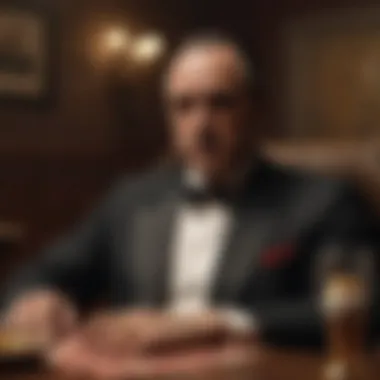
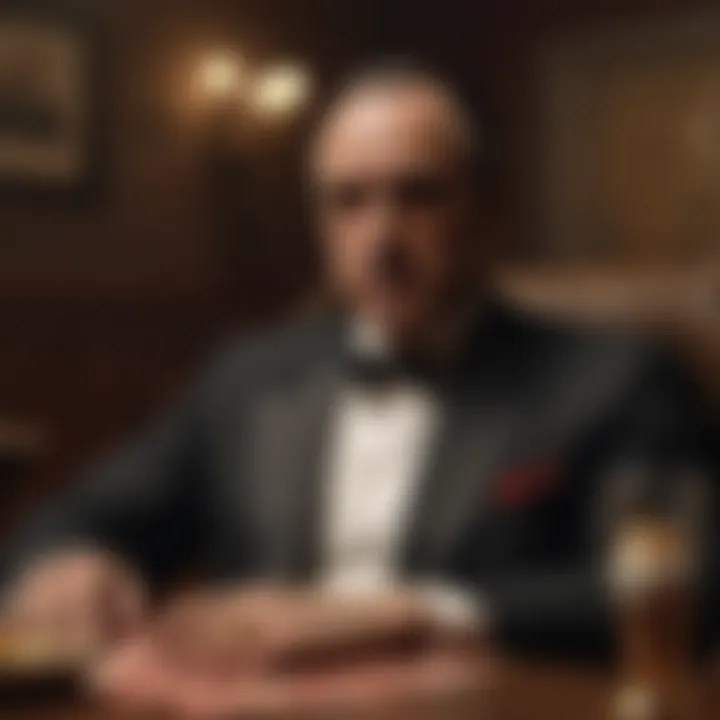
"The more power you get, the more enemies you make."
This quote could very well summarize the trajectory of key characters in the series, reinforcing that power does not just elevate but also isolates and corrupts.
Corruption within the Corporate Structure
Corruption plays a pivotal role in illustrating how moral lines blur in the pursuit of success. The corporate structure depicted in The Godfather serves as a microcosm of larger societal failures. Franchise and even legitimate businesses face their own forms of corruption, be it through deals with the mafia or through the exploitation of the law.
In a striking manner, the films challenge the notion of what constitutes legitimate business practices. Characters like Tom Hagen, who straddles the line between legal counsel and mob advisor, embody this conflict. Hagen's character suggests that the world of commerce and crime are often intricately linked, raising questions about integrity and accountability within the corporate landscape.
Here, viewers witness that even in a modern context, where clean-cut dealings occupy the mainstream, the shadows of corruption loom large. This element enriches the narrative, offering a stark reminder that power can easily lead to systemic decay.
Family vs. Business
The delicate balance between family loyalty and business interests is perhaps one of the most resonant themes in the series. At first glance, the Corleone family seems to embody ironclad loyalty. However, as the story progresses, the friction between familial obligations and ruthless business decisions becomes increasingly evident.
Michael Corleone's ascent to power starkly illustrates this conflict. He finds himself at a crossroads: prioritize his love for his family or pursue the power needed to secure their future. This duality often leads to tragic outcomes, notably the strained relationships among family members, including the heartbreaking betrayal by Fredo.
This theme serves as a critical lens through which the audience can examine their own values concerning loyalty and morality. The films suggest that in the world of business, as in life, choices often come with profound consequences, blurred by the shades of gray that define both love and ambition.
Ultimately, The Godfather series leaves viewers pondering over the intersections of power, corruption, and family, encouraging a deeper reflection on the personal costs associated with these elements. It invites us to evaluate not just the journey of Michael Corleone, but also our understanding of power dynamics in our lives and society at large.
Cinematography and Direction
In the realm of cinematic storytelling, cinematography and direction hold pivotal roles that shape the viewer's experience. The lens through which we see a story can significantly influence our emotions and interpretations. In the case of 'The Godfather' series, these elements aren't just technical details; rather, they serve as the backbone for the narrative's richness and complexity. Francis Ford Coppola’s meticulous attention to detail in both cinematography and direction elevates the films from mere entertainment to monumental works of art.
Francis Ford Coppola's Vision
Coppola’s approach to direction is characterized by his fascinating ability to blend personal storytelling with broader sociopolitical themes. He didn’t just want to make films about crime families; he sought to explore themes of loyalty, power, and decay in the American Dream. This vision is evident in how he meticulously crafts each scene, constructing a world that feels both authentic and surreal. His deep character studies reveal nuances that transcend mere gangster tropes.
For instance, his ability to guide performances is remarkable. Marlon Brando’s portrayal of Vito Corleone would not have reached its iconic status without Coppola’s nuanced direction. The director often allowed room for improvisation, creating a fluidity in the performance that brought an authentic vibe to the characters. This approach offered a sense of realism, providing audiences with a more profound connection to the narrative. By sticthing together moments of vulnerability with stark brutality, Coppola crafts a dichotomy that keeps viewers constantly intrigued.
Visual Storytelling Techniques
In addition to his directorial prowess, Coppola’s use of visual storytelling techniques deeply enhances the narrative. Two key aspects stand out in this regard: lighting and framing. Both of these elements work synergistically to convey mood and power dynamics within scenes.
Lighting
Lighting in 'The Godfather' is more than just a means to illuminate the setting; it’s a narrative device in its own right. The use of chiaroscuro—sharp contrasts between light and dark—adds layers of meaning to various scenes. For example, dimly lit rooms often signify moral ambiguity, reflecting the characters' internal struggles. This contrasts starkly with brighter scenes that typically denote moments of clarity or decisions made in the light of day.
A key characteristic of this lighting style is its dramatic flair, which highlights major emotional themes. It's been said that lighting in these films is designed to make viewers feel like they’re tiptoeing into the shadows of the Corleone family’s conscience. The unique feature of this approach is its ability to create suspense. The viewer often finds themselves on edge, unsure of what's lurking in the darkness. However, one disadvantage to keep in mind is that excessive darkness can sometimes confuse the audience, making it challenging to follow the action.
Framing
Framing is another vital element that contributes to the narrative depth in 'The Godfather.' Coppola's meticulous composition of shots provides insights into character relationships and power dynamics. Significant portions of the story rely on how characters are visually presented in relation to one another. For instance, shots that show Michael Corleone positioned low in frame while his adversaries loom above him create a palpable sense of tension and authority imbalance.
The key characteristic of Coppola’s framing technique is his strategic use of space, which often conveys the weight of decisions and the emotional stakes at hand. A common practice is to use close-ups to amplify feelings of isolation, particularly during pivotal decision-making moments. The unique aspect of this technique is that it pulls the audience into the intimate space of the characters, fostering a deeper emotional connection.
One advantage of this approach is its ability to clarify complex relationships; however, it can sometimes yield an overly stylized effect that may distract from the overall narrative.
"A great movie is a story that is told well, and in this case, every frame, every shadow, serves that greater purpose."
Cinematography and direction in 'The Godfather' are not just complementary facets; they are essential instruments that shape its storytelling. Both Coppola's vision and his technical mastery illuminate the film's themes, making them significant not just for their era, but for generations to come.
Cultural Impact
The cultural impact of 'The Godfather' series is nothing short of monumental. From its release in the early 1970s, the films quickly carved a niche in the popular imagination, transcending the typical confines of cinema to become a cultural touchstone. Aldo and Frances Ford Coppola's epic narratives and layered characters stirred audiences and prompted discussions that continue to this day. These movies not only highlighted issues of power and loyalty, they also served as a lens through which audiences could explore the darker side of the American Dream. Amid this backdrop, it's critical to examine not just the what but also the how and why this series has left an indelible mark on both film and society.
One of the notable elements of this cultural impact lies in its influence on filmmakers and storytellers alike. The narrative structure and character complexity have set a benchmark for storytelling that many aspire to. Directors study the pacing and atmosphere Coppola achieved, often attempting to replicate that magic in their own work. Thus, the series serves not just as entertainment, but as an educational text for budding filmmakers.
Additionally, the undercurrents of themes such as family ties and moral dilemmas resonate with people widely, often blurring the lines between fiction and reality. This layering of themes makes discussions around the films not just relevant but necessary as societies grapple with similar issues in real life. All these facets contribute to a vibrant discourse around the topics tackled within the films, illustrating their lasting relevance.
Influence on Other Films
The Godfather's influence on cinema has been extensive, prompting filmmakers to draw on its stylistic choices, thematic explorations, and narrative approaches. For instance, modern gangster films like Scarface and Goodfellas openly acknowledge their debt to Coppola's masterpiece. The intermingling of family dynamics with crime, often portrayed with a gritty realism, reflects the qualities that made The Godfather so unique.
More sophisticated filmmakers have also integrated its narrative techniques into their movies. Quentin Tarantino, for instance, borrows elements from Coppola's works, evident in his use of non-linear storytelling. The character-driven plots in movies like The Departed can be traced back to the complex relationships and motivations found in the Corleone family.
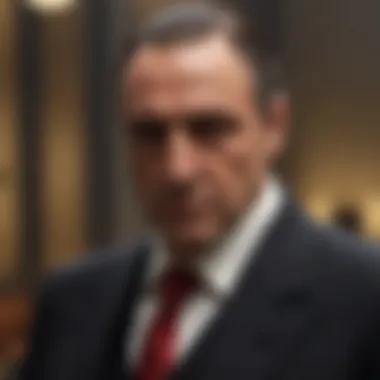
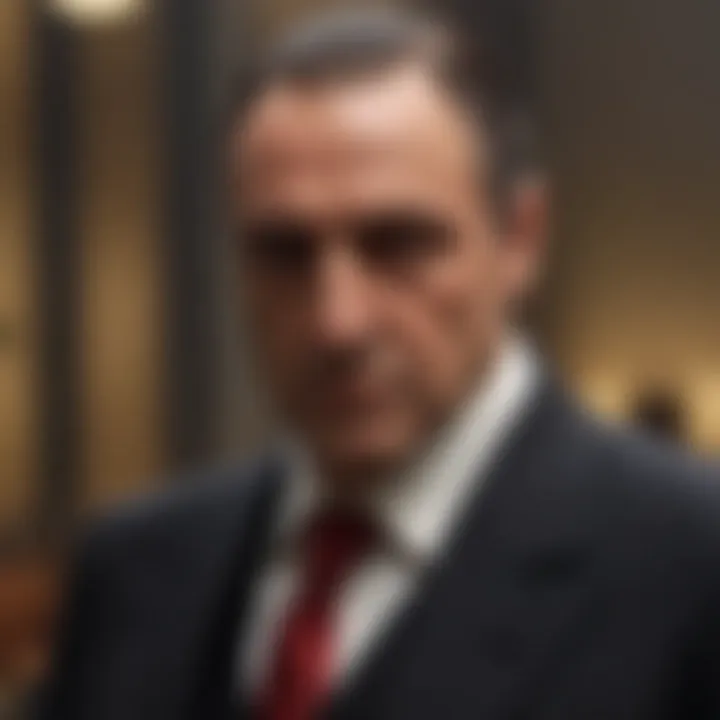
Moreover, the film's cinematography has sparked admiration among directors striving for visual storytelling. The strategic use of light and shadow seen in the series is echoed in films like Blade Runner 2049, as directors continue to employ such aesthetic choices to evoke emotion.
References in Popular Culture
The Godfather has not only influenced cinema but has also seeped into the broader cultural landscape. Quotations from the film, such as "I'm going to make him an offer he can't refuse," have woven themselves into everyday language, serving as shorthand for negotiations or coercive offers in various contexts. This speaks volumes about the film’s pervasion into the collective consciousness.
Moreover, numerous television shows and series, from The Sopranos to Breaking Bad, have taken cues from the complex characters and moral quagmires pioneered by Coppola's films. In a similar vein, the series has seen homage paid through parodies in multiple shows. For instance, The Simpsons has referenced the films countless times, highlighting the universal themes and quirks of its storytelling.
In gaming, the cultural footprint is no less significant. Titles like The Godfather: The Game let players step into the shoes of the Corleone family, allowing for an interactive exploration of its themes. Even popular board games take inspiration, as players navigate family ties and alliances reminiscent of the films’ narrative arcs.
"The Godfather is not just a film series; it is a cultural phenomenon that has reached into various mediums, shaping how stories are told across generations."
In sum, the cultural impact of 'The Godfather' series represents a fascinating interplay of narrative, themes, and real-world reflections, reinforcing its status as a cornerstone of cinematic history.
Audience Reception
Understanding the audience reception of The Godfather series is crucial for appreciating its place in cinematic history. The films didn't merely entertain; they sparked conversations, revived cultural dialogues, and even influenced societal views on organized crime and family dynamics. The response from critics and viewers alike is significant for numerous reasons. It reflects the emotional resonance the films created and the impact they had on public perceptions of the Mafia. Moreover, examining reactions can shed light on the evolving attitudes toward violence on screen and the morality depicted in film.
Critical Acclaim and Controversies
Upon their release, the films in The Godfather trilogy received widespread acclaim and generated substantial controversy. Critics hailed The Godfather, released in 1972, as a masterpiece, praising its intricate storytelling, compelling characters, and stunning cinematography. It won three Academy Awards, including Best Picture, which underlined its artistic merit. The sequels, The Godfather Part II and The Godfather Part III, while considered by many as sequels that expanded upon the original's success, drew mixed reactions.
However, controversies abounded. The depiction of Mafia life raised questions about glorifying organized crime. Some audiences felt that the series romanticized violence or oversimplified the complexities of its characters. Vito Corleone, a figure often seen as a paternalistic anti-hero, faced criticism for eliciting sympathy in what many considered a vile profession. Critics argued that the films could propagate dangerous stereotypes about Italian-Americans, portraying them as inherently linked to organized crime. This complexity has led to ongoing debates about the intersection of art, representation, and morality in cinema.
Box Office Performance
Box office figures for the trilogy tell a tale of monumental success. The Godfather grossed around $250 million domestically on a modest budget of $6 million, making it one of the highest-grossing films of its time. The Godfather Part II followed with similar fiscal success, raking in about $193 million worldwide, solidifying its reputation as a quality sequel that retained the original's viewers while attracting new ones. When The Godfather Part III was released in 1990, expectations were sky-high. Despite not reaching the financial heights of its predecessors, it still grossed over $136 million, a notable figure but regarded by many as underwhelming given the legacy it was built upon.
If we look deeper, these financial successes correlate with how the audience engaged with the films. The lure of lavish settings, well-crafted dialogue, and morally nuanced storytelling became an undeniable draw for moviegoers.
Legacy of 'The Godfather'
The influence of 'The Godfather' series resonates through the film community and beyond, painting a portrait of the struggles between family loyalty and power. Its legacy is multifaceted, strong enough to echo throughout various sectors of culture, including television, literature, and even music. What makes this legacy crucial to understanding the films lies in its ability to not just engage audiences, but to spark conversations around broader themes such as morality, identity, and the American Dream.
Long-term Cultural Significance
When we talk about the cultural significance of 'The Godfather', we delve into a treasure chest of narratives and ideas that have become staples in discussions about cinema. First off, the phrases and quotes from the films have entered common language, becoming shorthand for concepts like loyalty and betrayal. Phrases such as "I'm going to make him an offer he can't refuse" have transcended their origins, appearing in various contexts from politics to everyday banter among friends.
Moreover, beyond mere quotes, the series forced audiences to rethink their perceptions of organized crime. Rather than presenting the mob as a mere representation of evil, it humanized characters, allowing viewers to empathize with their struggles and dilemmas. This shift in perspective opened up new storytelling avenues in modern cinema.
- The deep, flawed characters created a new archetype for antiheroes.
- The films also boldly challenged the traditional notions of heroism and villainy.
- Its exploration of complex family dynamics provided a lens through which audiences could analyze their own relationships, often reflecting societal complexities.
"It wasn't just another gangster film; it became a cultural touchstone that resonated with issues of identity and morality."
Influence on Modern Cinema
The influence of 'The Godfather' series can be felt in various modern films, where elements of its storytelling, character development, and even cinematographic choices have been adapted and reinterpreted. Directors like Martin Scorsese and Quentin Tarantino have drawn on its rich narrative textures, evident in their ability to weave together character-driven plots laden with moral ambiguity.
In addition, the shift towards character-focused storytelling can be attributed largely to this franchise. Within the realm of modern cinema, films that embrace character depth, nuanced motivations, and ethical quandaries owe a debt to the groundwork laid by Copolla and his team. Today, viewers expect layered characters rather than token representations of good and evil.
- The trend towards sprawling narratives over multiple films owes a lot to how 'The Godfather' expanded its universe.
- It also paved the way for sequels that don’t just attempt to recapture the original's success but instead build on existing themes and characters.
In essence, the legacy of 'The Godfather' continues to shape the cinematic landscape by challenging filmmakers to push the boundaries of storytelling and to present narratives that are as rich and complicated as life itself.
Culmination
The conclusion of this exploration into 'The Godfather' series serves as a pivotal moment where reflections on the franchise’s long-standing significance come to light. This series is not merely a set of films, but a profound cultural artifact that continues to resonate across generations. It sheds light on themes of family loyalty, the moral complexities of power dynamics, and the blurry lines between right and wrong. These elements not only contribute to its storytelling but also make it a case study for examining societal values, ethics, and the American Dream itself.
Reflection on the Series' Impact
The impact of 'The Godfather' on popular culture and cinema at large is nothing short of monumental. It established a template for gangster films, embedding certain tropes and character archetypes that have permeated cinematic storytelling since. Moreover, it has given rise to discussions about organized crime that go beyond the screen. Audiences find themselves questioning their preconceptions about morality and justice, thanks to the morally ambivalent characters such as Michael Corleone. An analysis of its critical reception reveals how it challenged audiences to reconsider their views on authority, family obligations, and the consequence of one's choices.
To encapsulate its cultural resonance:
- Influence on Filmmaking: Directors like Martin Scorsese and Quentin Tarantino have cited the franchise as a significant reference point in their own creations.
- Cinematic Language: The use of lighting and composition set a standard that many films still aspire to achieve.
- Memorable Quotations: Iconic lines like "I'm going to make him an offer he can't refuse" have transcended their origin, finding their way into everyday conversation.
"The Godfather is a poem about America; it is an intriguing study of power, loss, and identity."
Future of the 'Godfather' Legacy
Looking ahead, the legacy of 'The Godfather' appears poised to thrive in a world where nostalgia is increasingly harnessed in media. The hallmarks of the series—its character-driven storytelling and complex moral tapestry—will likely inspire both reboots and original works in future cinema. As audiences continue to embrace stories that reflect on societal issues while providing gripping narrative experiences, one could imagine a series of adaptations that revisit or recontextualize these themes for newer generations.
Furthermore, the upcoming generations of filmmakers have the opportunity to reinterpret Vito and Michael’s stories, perhaps infusing modern issues such as globalization and digital ethics into the narrative fabric. The essence of what 'The Godfather' represents—struggles for power, the weight of family legacy, and the moral grayness of decision-making—remains ever-relevant.
In summary, wrapping up the analysis not only underscores the importance of the series in cinematic history but also highlights its potential avenues for exploration, reaffirming its place within the cultural dialogue for years to come.



